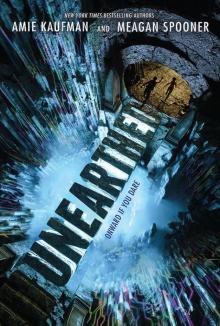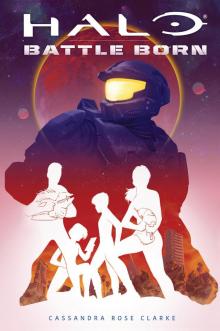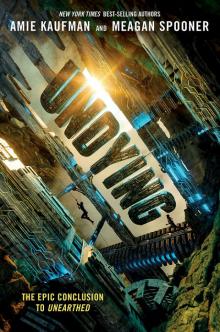- Home
- Amie Kaufman
Undying Page 2
Undying Read online
Page 2
Then comes a gusty sigh and a muttered word I don’t know, though I certainly recognize its tone. A tap of fingers on controls, and then a voice: “Screen repair request, shifting it yourways for recyc now.”
The worker’s footsteps start moving again, but we’re both frozen when a crackly voice bleats tinnily in the small room. Until now, he’s always spoken to the others through his headset—this is the first time we’ve heard them use a communications system built into the ship.
“Sirsly?” The voice is more annoyed than professional. “That’s two you’ve lixo’d since we shifted.”
“Don’t give me hassle, it’s just the screen,” protests Slacker, coming to a halt only a meter or so from the hatch, which I’m still holding in place. I have a brief flash of panic that “recyc” is somehow the vent we’re hiding in, but then he pulls a drawer-like receptacle out of the wall and places the headset in it. “It still works, just cracked-like.”
“Hold up your send, someone’s using the transit.”
Slacker sighs, starting back toward his console. “Broken piece of lixo ship,” he mutters.
I can still see the drawer if I crane my neck. The ship has a built-in delivery system, not unlike the old vacuum tubes they used to use in banks and post offices on Earth. It’s how we’ve been stealing food—if you can call the flavorless, rubbery white protein cubes food—intercepting deliveries to individual rooms and stations.
Abruptly, I realize he’s sending his headset down that way. And there are precious few seconds before he hits the button that’ll send it zooming away.
“Don’t move,” I breathe, watching the boots intently as I ease forward, keeping the hatch clutched in one hand.
Jules goes rigid under my fingers, choking a protest. I squeeze his leg to reassure him, all too aware there’s nothing he can do to stop me without getting us both caught. We’ve wasted a week waiting for someone on Earth to notice the ship in orbit isn’t empty—this is our first chance to take action, rather than waiting to be rescued. I won’t let it slip away because I’m scared.
I slide out of the tunnel, lowering myself down and carefully placing one foot and then the other, my eyes on the Undying worker the whole while.
For an instant, I’m standing only a few meters away from him, looking at his back as he gazes down at the console, waiting for permission to proceed. It’s the closest either of us have been to the Undying since they arrived. I can’t see his face, but from the back he could be any normal Earth boy, right down to the impatient drumming of his fingertips against the console. His skin is a rich, dark brown, and his hair falls to his shoulders in tousled waves that remind me of Evie’s. My whole body shrinks from the idea of this ancient alien menace masquerading as something so familiar.
It’s so easy to forget they’re not human. Like us. But when I look at this thing, all I can think of are those first few frantic moments after the Undying portals first activated. Jules and I hid, terrified of the bulbous-looking heads and jet-black suits, and got the shock of our lives when one of them took off its helmet to reveal it wore a human face underneath.
A few hours of watching them march about the ship from our ventilation shaft, and Jules whispered, “They’re human—they may be different, but maybe we can just talk to them? Find out how and why they’re here, explain who we are?”
The suggestion made every hair on the back of my neck lift and prickle, but he’d squeezed my hand and looked at me with those big, brown, Jules-sweet eyes, and for a moment I was ready to lead us out of hiding, to throw ourselves on the mercy of these ancient beings. And then one of them slipped on a patch of melted snow from the ship’s resting place on Gaia, and fell into a bit of exposed rock wall.
With a cry he fell, clutching his leg—and a spray of bright blue blood spattered across the wall opposite.
Jules had frozen, his hand suddenly ice-cold in mine.
Whatever these things are, they’re not human. They’re nothing like us. And if they catch us, there will be no mercy.
Now, looking at one of them standing casually at his workstation, it’s somehow even worse than if they’d remained bulbous-headed mysteries.
My hands are steady, though, as they slide the drawer back open and retrieve the headset.
I’m retreating slowly back toward the hatch, clutching my prize, when the intercom crackles again with the all clear. He’ll sit once he sends it, and I’ll be well within his peripheral vision. I almost stumble in my haste, grabbing at the edge of the ventilation shaft and withdrawing into its cramped confines like a hermit crab scuttling back into its shell. He turns to hit the button, and I pull the hatch into place with a tiny clang that sounds in time with the whoosh of moving air just above us in the wall.
Neither of us moves for several long, tortured heartbeats. Slacker eases back down onto his bench, and with a sigh, bends over the console. The ship has none of the fancy tech the Undying wear and use as they go about their day, and they rarely seem to use much of the built-in technology that to us seems so advanced. But, without his headset, Slacker’s working like someone forced to switch from digital back to analog.
We wait a few more minutes, Jules’s body still stiff with panic and outrage. Then, as silently as we can, we slip away into the walls once more.
“Of all the foolish, impulsive risks—” Jules’s whisper is infuriated once we emerge into the Junction.
“Shut up!” I retort, scowling. “It worked, didn’t it?” It’s exactly what we needed: a chance to get a step ahead of these alien beings for once, and maybe even find a way home, all without them ever knowing we’ve stolen anything, because the headset was on its way to be recycled.
“Mehercule, every time I think I know just how stubborn and reckless you are, you go and pull something—”
“I don’t want to die up here, Jules!” I gulp for breath, trying to stop my voice shaking. “And if I do, I want to go out fighting, not hunted down like a couple of rats in the wall.”
Jules runs a hand over his face, features glinting with perspiration in the pale blue light of the wrist unit. “Let me see the headset,” he says resignedly.
The request is a peace offering, and I respond with one of my own as I hand over the stolen headset. “You wanted more time with it to see if we can call home. Don’t say I never get you anything pretty.”
Jules’s lips press together as he carefully inspects the headset. “Don’t ever buy me a birthday present,” he mutters. Then his eyes flick up to meet mine, and his lips relax into a little smile.
I grin at him and then fold myself into the edge of the meager space in the Junction, to make room for him at my side. My heart is still racing, and every tiny sound—not uncommon, inside the walls of an ancient spaceship—makes me jump. The close call is enough to make me snap, but I force myself to at least seem calm for Jules’s sake.
A quick look at his wrist screen tells me we’ve got a little less than an hour before our neighbors, Atlanta and Dex, finish their shifts and return to their cabin. An hour to talk.
Jules finishes his inspection by slipping the headset into place, which makes it come to life again. “The screen’s cracked,” he reports, his visible eye distant as the hidden one focuses on the glass. “But I can still see most of what’s on it.”
Triumphant, I rummage around in the shadows beneath the pipe that carries water throughout the ship. My fingers locate the remains of breakfast, a block of sponge-like cubes the size of my palm. I break it apart and bite into a cube, putting the rest aside for Jules. He’s bigger than me, and eats more, and when he goes off into one of his scholar fits of intensive study, he always comes out ravenous. And every time, he’s surprised by how hungry he is.
“What is it saying?” I ask, all too aware that he’ll forget I’m even there, in the midst of his intellectual exploration.
Jules shakes his head. “It’s—hard to say. It’s like it’s interfacing with my brain waves somehow, reading my mind … every little di
stracted thought I have, it tries to run with.”
“Maybe that’s why it’s in English, not glyphs.” I lean to the side, but I’d have to press my face to Jules’s to see anything on the glass, and I abandon the attempt. “It reads your mind and translates itself into the language you speak most easily.”
“Maybe.” Jules’s voice sounds troubled, but it’s clear he has no better explanation. “I can’t get it to give me anything about communication, except to other headsets. Nothing about transmitting to a nearby planet.”
“What about a map of the ship?” I suggest, chewing, trying not to let my disappointment out in my voice. We have time—Jules may yet figure out how to use the headset to signal Earth to come get us. And, you know, stop the Undying, but maybe rescue us first.
“A map of the ship isn’t exactly going to tell us what they’re doing here, what they want with Earth.”
“But it might show us if there’s a communications center we could use to talk to Earth. Or at least how to stay hidden a while longer.” Although I know he wants to get home as badly as I do—and he knows finding a way to send a message is key to that—he does keep circling around to his old research instincts. He keeps wondering what the Undying plan to do, trying to understand them like the academic he is.
What I need him to remember is that it doesn’t matter what the Undying are doing here, because even if we knew, we couldn’t do anything about it unless we could send a message home.
Jules sighs. “I’ll try to find a map.”
And then he’s gone. I leave him to it, leaning back against the wall, ignoring the now-familiar ache its angled surface brings to my shoulders. I’m wearing his wrist unit right now, and by its light I survey the objects scattered about our hideout.
To anyone else, our supplies would seem pathetically few. A shallow cup improvised from a piece of waterproof mesh cut from one of their discarded jumpsuits, stretched across a frame made from crumpled foil from the food blocks, catches water that drips from a tiny hole we’ve cut in the pipe. The rest of the uniform fabric, gathered up to serve as a blanket. My multi-tool, the only thing we have to cut, harvest, craft what we need.
Not much, when you think about the fact that these bits of junk are the only weapons we have to defend ourselves against a clearly hostile army. But each object represents a victory, some risk or gambit made to secure it. And we’ve had precious few of those.
Unless you call staying alive—and undetected—for this long a victory.
Which I do, dammit.
Our only advantage is that the Undying don’t know we’re aboard their ship. They’re not careless, but they also don’t have any guards posted in every corridor like they might if they suspected foul play. Still, the ship is getting busier by the day, with more Undying coming through the portals all the time.
The portals are a mystery to us—we know they lead from one place to another, that the Undying can choose those locations, and build them the size of a spaceship, or of a regular door … but we don’t know how they do any of it. Twice, we’ve tried to sneak into that corridor full of portals to see if there was any way to use them to get home, but both times the whole place was chaotic with activity. There’s no way to get to them unseen.
Jules’s body is warm against mine. The air on the ship is several degrees lower than comfortable room temperature, although it doesn’t seem to bother the Undying. The chill combined with the confines of the Junction keep us in close quarters. But as much as I wish I could stretch out, spread my arms as wide as I can and take a deep breath, I’m grateful for the cramped space.
Because I’m not sure if I’d have the guts to snuggle up to Jules if there was more room.
He’s so absorbed in learning how to use the headset that I can watch him openly. He’s a mess, his clothes sweat-stained and grimy, with a noticeable scent I wish I could call “masculine” rather than “gross as hell”—but then, I’m just as bedraggled and unwashed as he is. You don’t get to shower when you’re a stowaway.
He looks tired, and that muscle ticking in his jaw means he’s holding tension there. I wonder if he’d even notice if I touched him—touched him more, I mean. He’s barely looked at me in the last few days.
Which is as it should be. We’re probably going to die—we’ve both accepted that, in our own separate ways, I think. But if there’s a chance to get a signal to Earth, we owe it to our families on Earth to try. I owe it to Evie. Even if she stays indentured to the club where she works for the rest of her life, it has to be better than what these aliens would have in store for her. Whatever the Undying are planning, the fact that they went to such enormous trouble to trick all of humanity suggests it’s not going to be a fiesta for the people we love.
With the weight of that on our shoulders, the last thing either of us should be thinking about is—
A clang makes us both jump, and my heart leaps into my throat. Voices from the wall at my back give us a source for the sound, and when another clang reverberates through the stone, I recognize it as the slam of the sliding door to the room on the other side of the vent at our feet.
Fumbling in my haste, I hide the blue glow of the wrist unit against my leg until I can turn it off, and Jules wriggles a strip of rubber from my boots down into place over the leak in the pipe. How much they can hear on their side, we don’t know, but the last thing we need is a maintenance crew coming through here looking for a leaky pipe.
The headset clinks as Jules sets it down. I see the glitter of his eyes in the darkness as they search for mine, and I know why he’s uneasy. From the first moment they arrived, the Undying have operated with clockwork precision. Not once has anyone missed a shift or arrived late.
Today, Atlanta and Dex are early.
“AW, COME ON, PEACHES, DON’T GIVE ME HASSLE.” THAT’S DEX, as two pairs of footsteps walk into the crew quarters on the other side of the wall.
“What kind of lixo’s peaches?” That’s Atlanta, sounding seriously unimpressed.
Mia and I exchange a wordless glance, then slowly ease down onto our sides, so we can watch through the vent at floor level—we’re invisible in the dark, but if we get the right angle we can see most of the neat little room, with its two bunks and tiny closet.
“Peaches are food,” Dex says, unpeeling the top half of his jumpsuit to reveal the undershirt below, giving me a glimpse of a tattoo as he knots the arms of the thing around his waist. He looks no older than we are, and neither does Atlanta. They look like teenagers—but all I can see when I look at them is that spray of blue blood, and for all I know he could be centuries older.
I glance at Mia again, and by the furrow in her brow, I know she’s noticed the tattoo as well. It’s one thing for these aliens to have done something to themselves—surgery, some kind of hallucinogenic projection—to look human. But for them to sport tattoos is an attention to detail that turns my blood to ice.
The Undying pair are still talking. “I searched it,” Dex protests. “You’re named for Atlanta, where they used to grow plants called peaches. Peaches is an endearment in proto-speak.”
“Did I do something to endear myself to you?” she asks pointedly, words punctuated by a thump as she throws herself down onto her bunk.
“Not this cycle,” he admits, sinking down opposite, just his shins and feet visible from our vent. “But I live in hope. Can we talk on this?”
“There’s nothing to talk on,” she snaps. The two of them squabble like siblings, exchanging barbs and little insults as often as they share affectionate jokes, but they’ve never outright fought before. Dex is easygoing and Atlanta’s more formal, but it’s clear they’ve known each other a long time. Maybe they grew up together. Wherever the hell they grew up. If they even grew up—to assume they had anything like a human childhood is to fall straight back into the trap of thinking they’re like us.
They’re both tall, around my height, and built on slender lines, though they’re wiry and strong rather than delicate. The
y both have the same light brown skin and black hair, though hers is sleeker and smooth, his thicker and curlier. They both keep it long enough to braid it back from their faces neatly.
“Slow it, Peaches.” His tone is conciliatory. “I pledge, I only think it’s worth thinking on requesting another destin. We can have our pick.”
Destin, my mind echoes, turning over furiously. As in destiny? I find myself hoping against hope that they’re about to tell us what they’re all doing here, and what they want with Earth.
“We’re taking Prime-One, okay? I didn’t get us to top roster to take some lixo know-seeking destin.” She sighs. “Have you seen what the world looks like down there? There’s more desert and smog than blue and green, the whole thing’s gonna be lixo soon … we gotta shift downwards, Dex. The sooner we get rid of them down there, the better.”
“I compren.” Dex’s voice is quiet. “And we will shift. I just—”
Atlanta’s voice sharpens. “What is this, Dex? You scared? You never been scared before.”
“Yeh, and I’m not scared now,” he says calmly. “And I’m not trying to give you hassle. All I’m saying is there’s a lot we don’t compren yet. You and I hold on, the first teams down to the surface are going to send beno data thisways. Give it a little time, and maybe we’ll know Prime-One isn’t as beno as we think. Maybe some more important destin comes ourways, and that’s when you and I step up.”
I can feel Mia’s shallow breaths where she’s pressed against my front. With her head tucked under my chin as we lie on our sides, we can share the view through the vent.
Atlanta huffs, unconvinced. “You can make anything sound beno.”
Dex laughs. “That’s why all the boys look myways,” he agrees.
Atlanta gives a massive sigh and folds her hands behind her head. “I want to shift now, Dex. What use is all our training if we only sit up here watching their television stories and reading their internets?”

 Unearthed
Unearthed Obsidio
Obsidio Gemina
Gemina Aurora Rising (ARC)
Aurora Rising (ARC) Memento
Memento Aurora Burning: The Aurora Cycle 2
Aurora Burning: The Aurora Cycle 2 Elementals: Battle Born
Elementals: Battle Born Aurora Rising
Aurora Rising Battle Born
Battle Born Undying
Undying Aurora Burning
Aurora Burning Scorch Dragons
Scorch Dragons Ice Wolves
Ice Wolves Aurora Rising: The Aurora Cycle 1
Aurora Rising: The Aurora Cycle 1 This Shattered World
This Shattered World These Broken Stars
These Broken Stars Their Fractured Light: A Starbound Novel
Their Fractured Light: A Starbound Novel Their Fractured Light
Their Fractured Light Ice Wolves (Elementals, Book 1)
Ice Wolves (Elementals, Book 1)